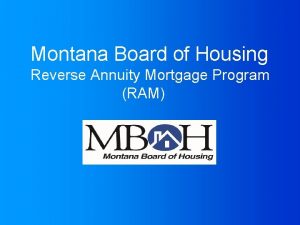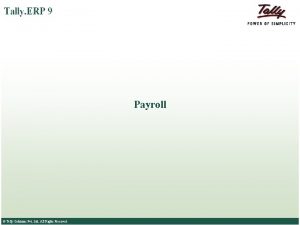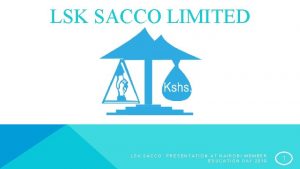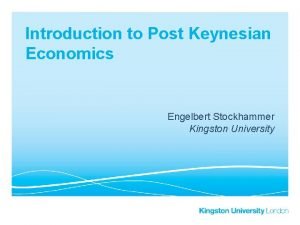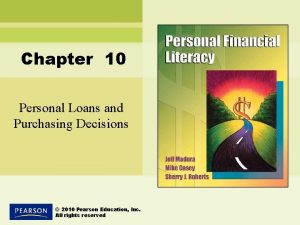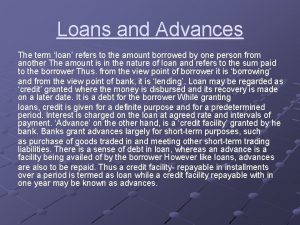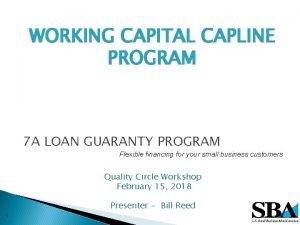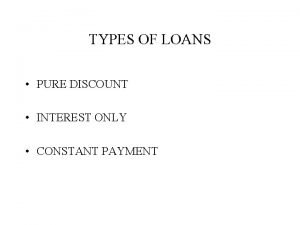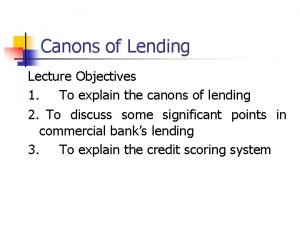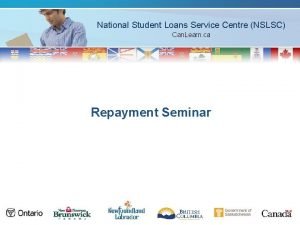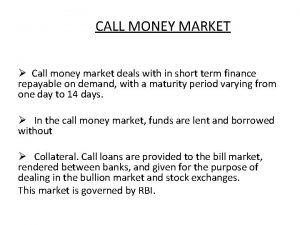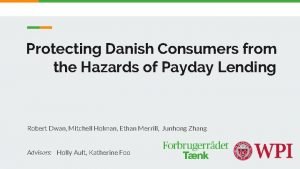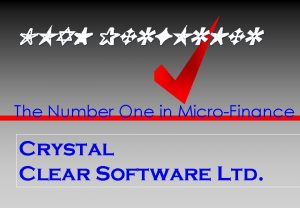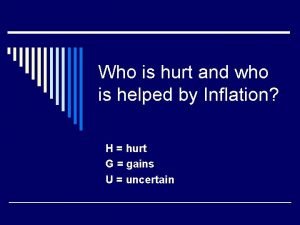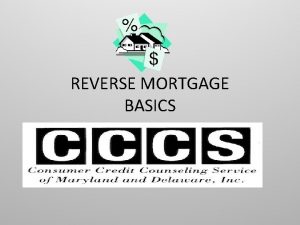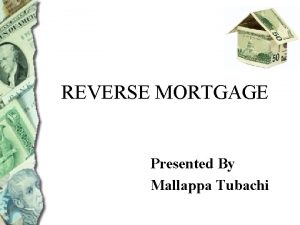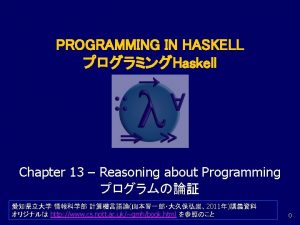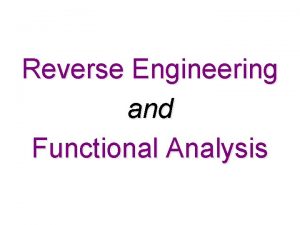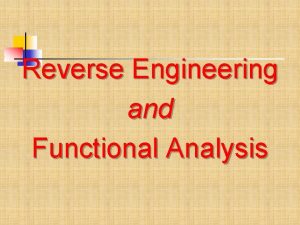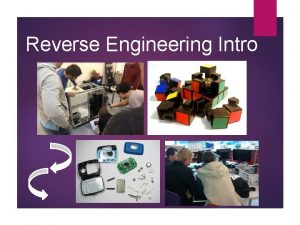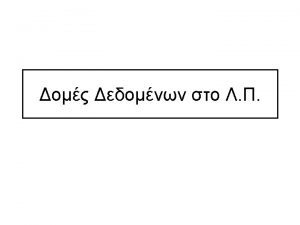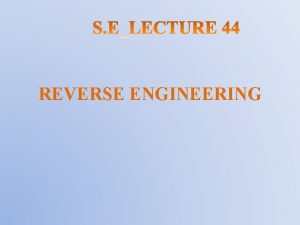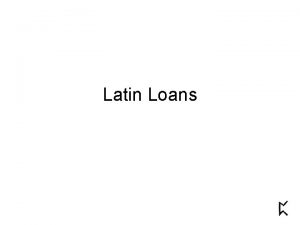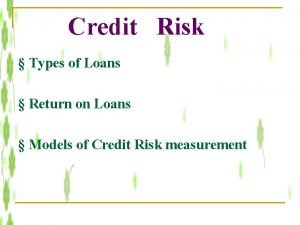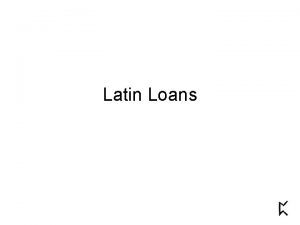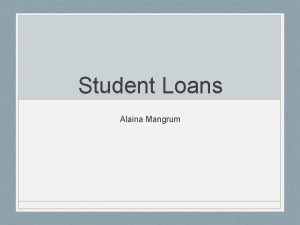Reverse Mortgage Loans Chris Grevelis Reverse Mortgage Specialist




















- Slides: 20

Reverse Mortgage Loans Chris Grevelis Reverse Mortgage Specialist 1

What is a Reverse Mortgage? n It’s a home loan that borrows against your home’s equity to supplement your retirement with extra, tax-free funds. n There are no monthly payments to make. You do not repay the loan for as long as your home remains your primary residence. 2

What is a Reverse Mortgage cont. n Loan proceeds are determined by ¨ Age of homeowner(s) ¨ Value of home ¨ Location of the home ¨ Interest rate 3

Age and Eligibility Requirements n You and any co-borrowers must be at least 62 years old. n Your home must be your primary residence. 4

Age and Eligibility Requirements cont. n Any existing mortgages will be paid off with the Reverse Mortgage proceeds. n There are no income, employment or credit qualifying restrictions. 5

Flexible Payment Options n You can obtain your Reverse Mortgage proceeds: In a lump sum payment to cover large expenses • In “Term” or “Tenure” monthly payments to supplement your income • As a line of credit to draw on as you need it • Or any combination of cash, monthly income and credit line you select (HECM only) • 6

Flexible Payment Options cont. n You can receive an immediate cash advance in addition to monthly payments. n You can change payment plans as many times as you wish. 7

Reverse Mortgage Repayment n No mortgage payments are required throughout the life of your Reverse Mortgage loan. n The loan may be repaid at anytime either in whole or in part and without penalty 8

Repayment cont. n Partial repayment can be used to increase your monthly income payments n The outstanding loan balance, plus accrued interest, becomes due when you sell or vacate your home. 9

Common Misconceptions n “The lender will take my house. ” ¨ Homeowner retains full ownership ¨ Reverse mortgage is a loan n “I can be thrown out of my home. ” ¨ Homeowner can stay in the home forever 10

Common Misconceptions cont. n “I can owe more than my home is worth. ” ¨ Homeowner can never owe more than the value of the home n “My heirs will be against it. ” ¨ Experience demonstrates that heirs are strongly in favor of reverse mortgages 11

Frequently Asked Questions n Question: When must the loan be repaid? n Answer: Your loan balance plus accrued interest becomes due when you no longer occupy the home (typically upon your death). After a grace period, your estate may repay the loan by selling the home or by paying off the balance due and keeping the home. 12

Frequently Asked Questions n Question: Will receiving my Reverse Mortgage proceeds in monthly payments affect my Social Security, Medicare supplemental security income, or Medicare benefits? n Answer: Social Security benefits and Medicare generally not affected by a reverse mortgage. You should consult your tax advisor. 13

Frequently Asked Questions n Question: Are there tax benefits to the borrower? n Answer: Yes there are benefits. It can be set up as a mini tax shelter, which you can discuss with your advisor. Or, upon vacating the property, you or your heirs can take the cumulative tax deductions that have accrued. 14

Example 1: Hedge n 70 year widow needs to supplement her income by $8, 800 per year (4% of her $220, 000 portfolio) n Between March 2000 and October 2001, her portfolio declines 36% and is now $140, 000 n $8, 800 would now equal a 6. 3% draw down rate and greatly increase the odds of her running out of money in her lifetime. 15

Solution n Secure a Reverse Mortgage giving her $109, 178 in a line of credit n Draw $8, 800 a year from her credit line rather than her investment portfolio n Allow her investment portfolio to recover 16

The Results n By 2006 her portfolio has recovered to $270, 000 n She is able to discontinue supplementing from her Reverse Mortgage credit line n Resumes 4% payments from her investment portfolio 17

Example 2: Fund LTC/Life Combo Situation n 65 year old couple n $300 K home n Minimal portfolio assets n Desires to leave an estate Problem n Statistically one spouse will require Long Term Care n Risk is high: the estate will be depleted 18

Solution n 1. 2. Establish Reverse Mortgage Credit Line & Fund “Shared LTC” Policy o 4 years protection for either spouse o Cost = 1/3 less than individual policies o $4, 960 per year “Second to Die” Life Policy o o o Amount = $500 K death benefit Cost = $5, 880 per year Total Annual Credit Line Withdrawals: $10, 840 19

Questions 20
 Reverse mortgages montana
Reverse mortgages montana Reocentral
Reocentral Loans and advances in tally
Loans and advances in tally Lsk sacco loans
Lsk sacco loans Melinda nixon vanderbilt
Melinda nixon vanderbilt Engelbert stockhammer
Engelbert stockhammer Loan vocabulary
Loan vocabulary Fha 203 h loan
Fha 203 h loan Short term loans and advances
Short term loans and advances Capline loans
Capline loans Mefa uplan
Mefa uplan Pure discount loan 中文
Pure discount loan 中文 The canons of lending are
The canons of lending are Nslsc contact
Nslsc contact Trade offers loans
Trade offers loans Features of money market
Features of money market Fha connection
Fha connection Payday loan in denmark
Payday loan in denmark Manulife bank investments
Manulife bank investments Loan performer software free download
Loan performer software free download Banks extend many fixed-rate loans
Banks extend many fixed-rate loans
